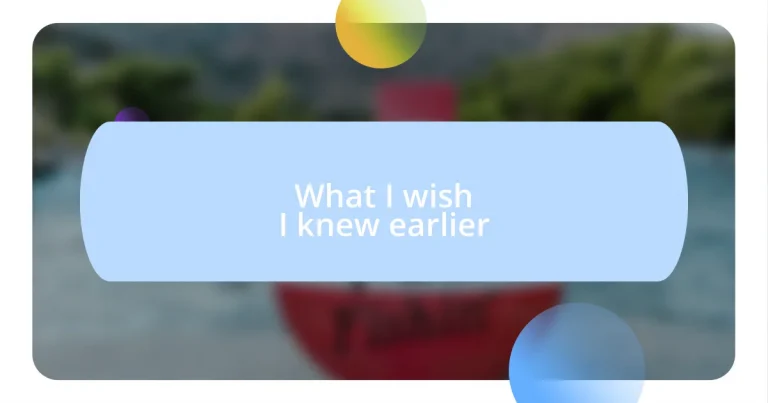Key takeaways:
- Mistakes should be viewed as valuable learning opportunities, emphasizing the importance of reflection for personal growth.
- Asking for help fosters stronger relationships and promotes a culture of trust and support in both personal and professional settings.
- Embracing failure as a part of the learning process encourages resilience, with each setback offering insights that contribute to future success.
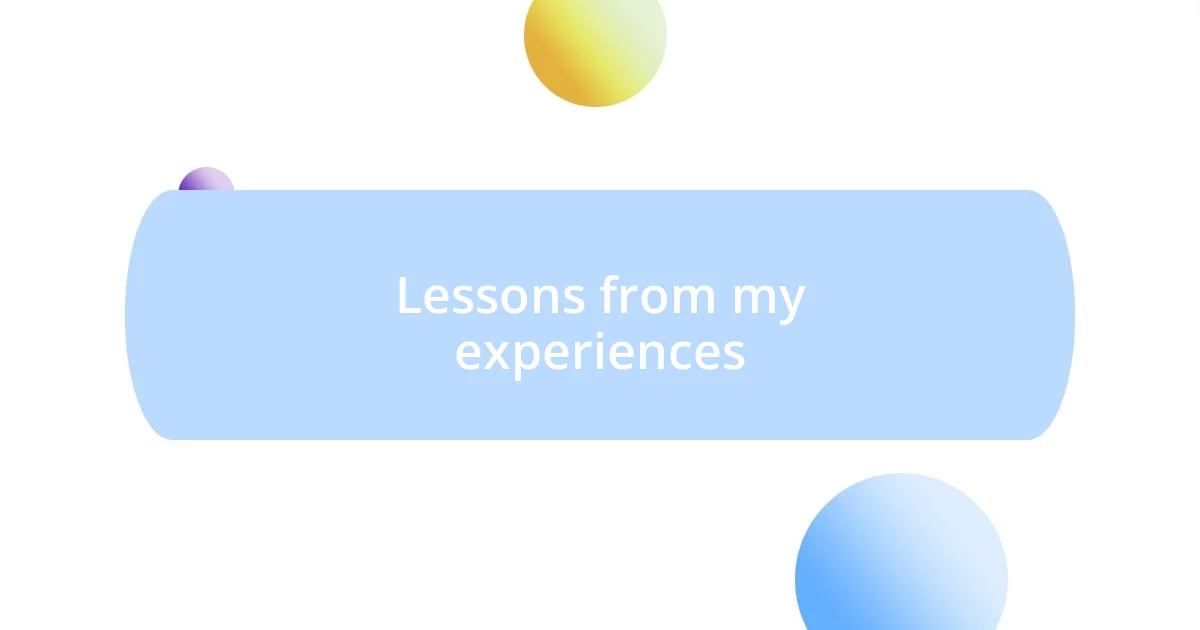
Lessons from my experiences
One of the most significant lessons I’ve learned is that mistakes are not failures but rather invaluable teachers. I remember a project I poured my heart into, only to see it flop spectacularly. At first, I felt crushed, but then I sat down and dissected what went wrong. That experience taught me the importance of reflection; it’s where the real growth happens.
I’ve also come to cherish the value of asking for help. Early in my career, I was hesitant to reach out to colleagues, thinking it would make me look incompetent. But one day, I finally mustered the courage to seek assistance on a challenging task. The support I received not only eased my workload but also fostered stronger relationships. Isn’t it funny how admitting vulnerability can lead to newfound connections?
Lastly, I’ve realized that timing is everything. There have been moments when I rushed a decision, only to regret it later. I learned the hard way that patience often yields better results. Have you ever noticed that when you take a step back, opportunities tend to present themselves more clearly? Now, I strive to give myself the space to breathe, allowing clarity to guide my choices.
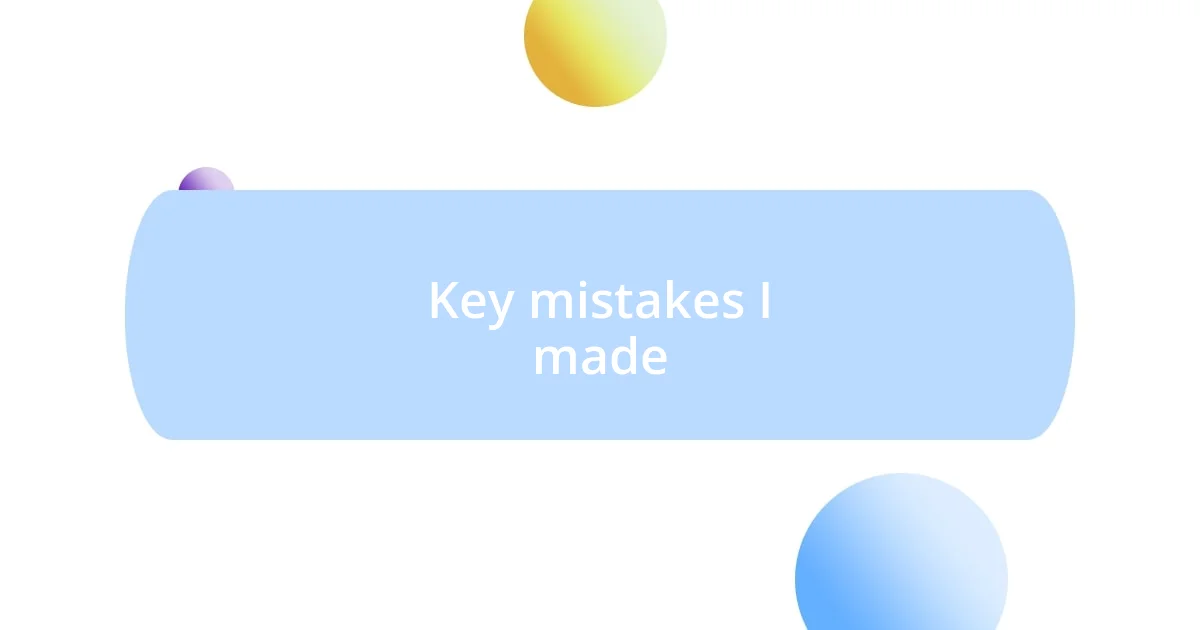
Key mistakes I made
Reflecting on my journey, I realize that one key mistake was underestimating the importance of planning. Early on, I dove headfirst into projects without a solid strategy, thinking that enthusiasm alone would carry me through. It’s a bit embarrassing to admit, but several times I found myself scrambling to fix avoidable mistakes at the last minute, leaving both my team and me feeling stressed and frustrated.
Here are some of the key mistakes I made along the way:
- Neglecting deadlines: I often thought I had more time than I really did, which led to rushed work and missed opportunities.
- Avoiding feedback: I hesitated to share my ideas with others for fear of criticism; it took me a while to realize that constructive feedback is a valuable gift.
- Not tracking progress: I would leap from task to task without checking if I was actually moving toward my goals, which resulted in wasted effort and time.
Another frequent misstep was failing to prioritize self-care. In those early days, I believed that working long hours and sacrificing personal time was a badge of honor. I vividly recall a period when I was so burnt out that even my passion projects felt heavy and burdensome. It was a wake-up call when I lost motivation; I understood that maintaining my energy and enthusiasm was essential not just for my work, but for my well-being.
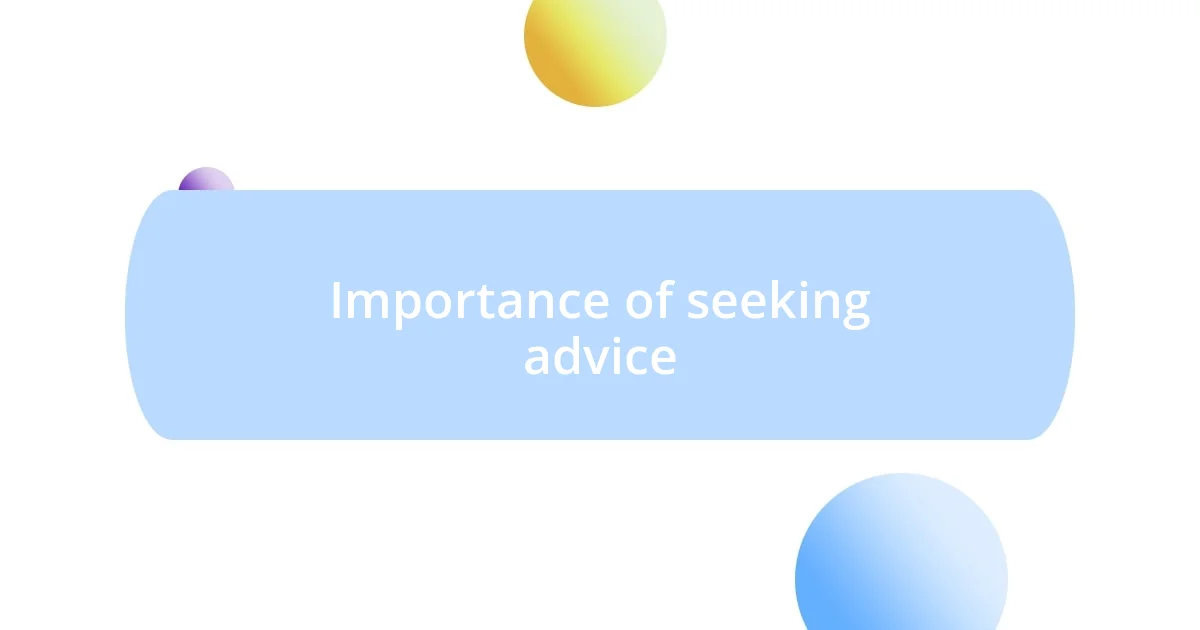
Importance of seeking advice
Seeking advice is a game-changer in both personal and professional realms. I vividly remember a time when I faced a career crossroads and was unsure of my next move. Instead of battling my uncertainties alone, I sought out a mentor who had been through similar experiences. Their guidance helped me understand my strengths better and gave me the confidence to take a leap into a new role. That moment truly emphasized how seeking advice can illuminate paths we might not see on our own.
On another occasion, I was grappling with a technical project that felt overwhelming. I decided to reach out to a peer who was well-versed in the subject. Sharing my struggles with them not only clarified my thinking but also introduced me to new tools and solutions that I hadn’t considered. It struck me then that collaboration could lead to incredible breakthroughs. Have you ever noticed that sometimes, simply talking things out with someone can unravel a tangled web of thoughts?
Finally, I believe seeking advice helps cultivate a culture of trust and openness. Every time I asked for help, I found that others felt more comfortable sharing their own challenges too. This mutual exchange creates a supportive network where everyone can grow. It’s fascinating how vulnerability can foster stronger teams, don’t you think?
| Advantages | Disadvantages |
|---|---|
| Gains new perspectives | May lead to too many opinions |
| Builds relationships | Risk of dependency |
| Avoids common pitfalls | Time-consuming |
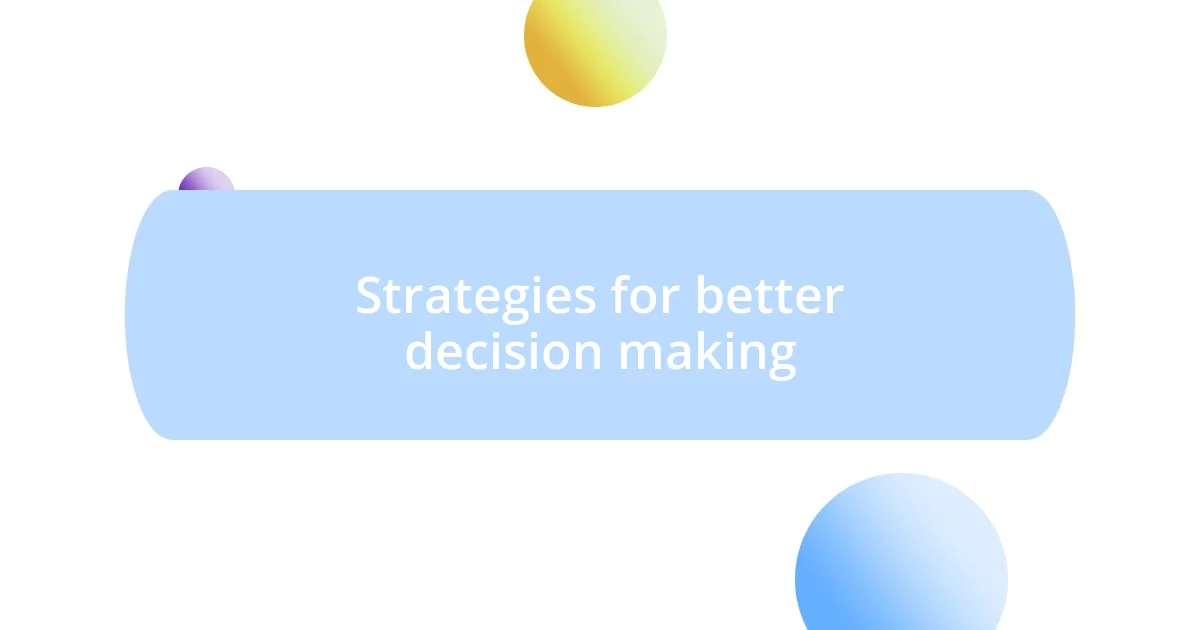
Strategies for better decision making
Making better decisions is essential in both our careers and personal lives. One strategy that I’ve found particularly helpful is to create a pros and cons list for significant choices. When I faced a tough decision about whether to accept a job offer that seemed appealing but came with uncertainties, jotting down the benefits and drawbacks helped clarify my thoughts. It’s remarkable how the simple act of writing things out can often reveal answers we didn’t realize we had.
Another tactic I swear by is to allow myself some time before committing. I used to rush into decisions, driven by fear of missing out or a ticking clock. I remember a specific moment when I jumped at an opportunity without giving it a second thought—only to realize weeks later it wasn’t the right fit. Now, I try to pause and reflect, allowing my gut feelings to surface, which often guides me toward more aligned choices. Have you ever felt that slight intuition nudging you in a different direction?
Lastly, embracing the idea of failure can completely change our decision-making landscape. I recall a time when I was hesitant to explore a new direction because I feared not succeeding. After some reflection, I realized that each misstep offered invaluable lessons. Now, I remind myself that every decision, right or wrong, contributes to my growth. How liberating it is to think that there’s no such thing as a wrong decision—only different paths that shape who we become!
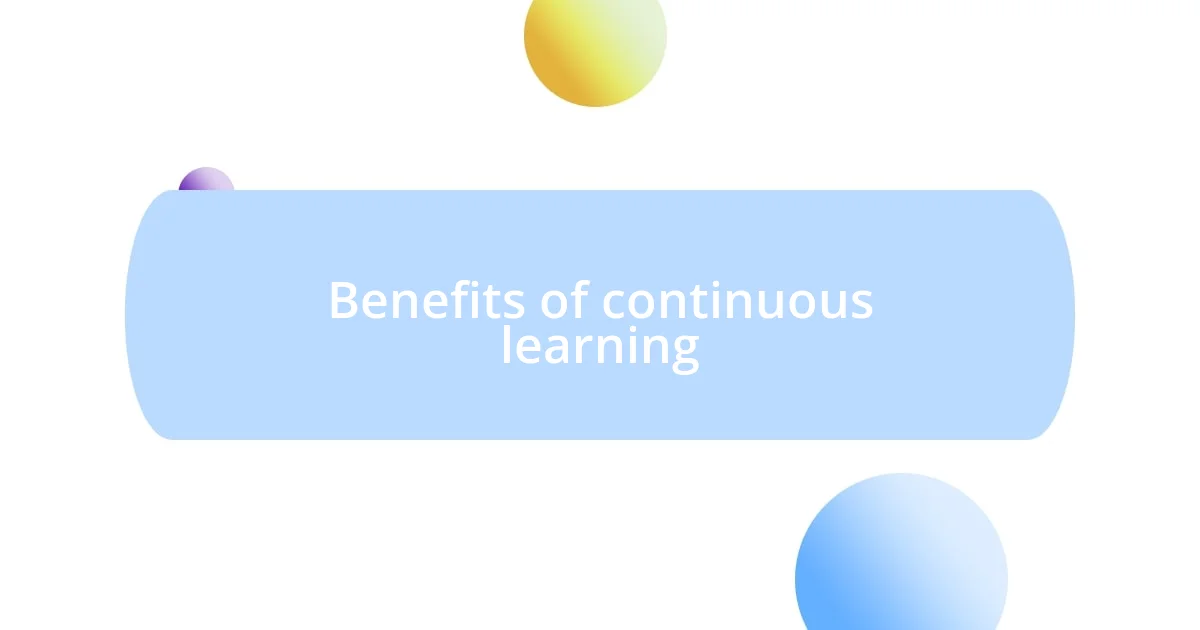
Benefits of continuous learning
Continuous learning enriches our lives in profound ways, and I’ve certainly felt its impact directly. One powerful benefit I’ve experienced is the sense of adaptability it fosters. I remember a time when my industry underwent a significant shift, thrusting us into the digital age. Rather than clinging to old methods, I engaged in online courses and webinars to grasp new trends. That willingness to learn not only helped me stay relevant but ultimately led to promotions and exciting projects. Have you ever felt the thrill of mastering something new, only to realize how much more you’re capable of?
Another notable advantage is the boost in confidence that continuous learning brings. I used to hesitate during meetings, fearing my knowledge might fall short. After committing to ongoing education, whether through books or workshops, I found myself contributing ideas with newfound assurance. Each piece of knowledge serves as a stepping stone, building a stronger foundation of expertise. I wonder, has there been a moment when you surprised yourself with what you’ve learned?
Moreover, engaging in continuous learning nurtures a sense of community. I recall joining a professional development group where members shared their learning journeys. The connections I built fostered friendships and collaborations that I hadn’t anticipated. It’s truly inspiring how learning together can cultivate a shared sense of purpose. Doesn’t it feel gratifying to know that you’re not alone on this journey of growth?
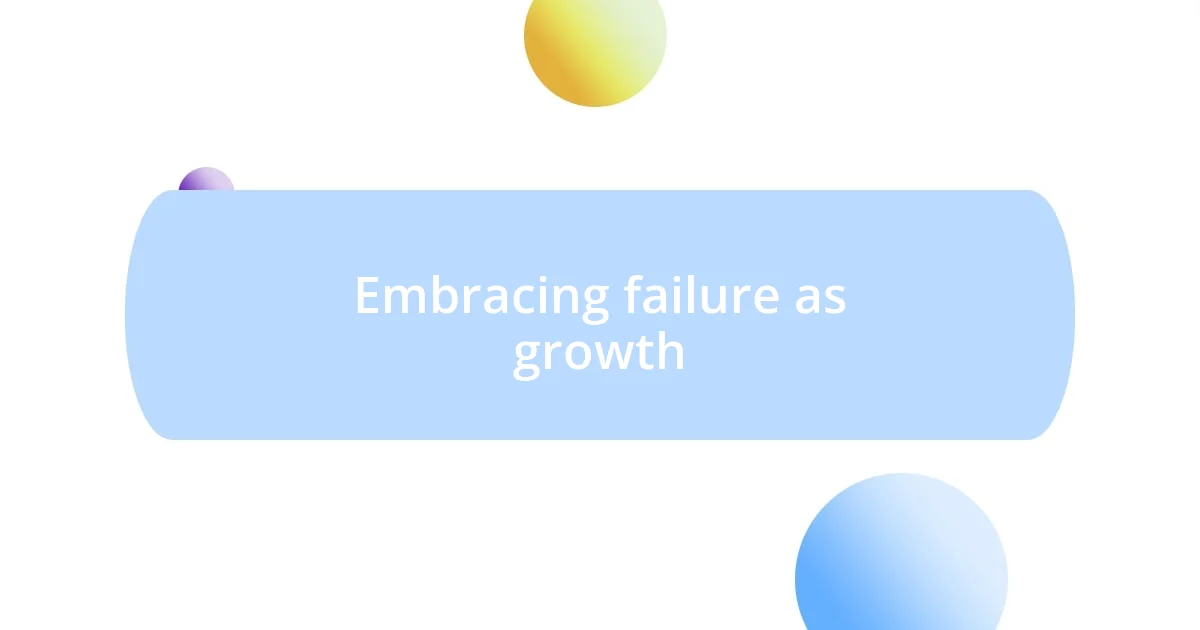
Embracing failure as growth
Embracing failure has been a transformative aspect of my journey, and I’d argue it’s one of the most underrated ingredients for growth. I vividly remember a project I poured my heart into only to see it flop entirely. At first, it stung, but as I reflected on what went wrong, I uncovered crucial insights that shaped my future endeavors. Have you ever faced a setback that, in hindsight, taught you more than a success ever could?
With each failure, I learned to shift my perspective and see it not as an end but as a stepping stone. I recall meeting a mentor who shared a powerful mantra: “Fail, learn, adjust, and try again.” This was a game-changer for me. Instead of wallowing in disappointment, I began viewing failures as essential lessons, helping me refine my skills and strategies. Isn’t it fascinating how resilience can be born from our lowest moments?
Ultimately, embracing failure demands vulnerability, a lesson I’ve learned through experience. I often hesitated to share my failures with others, fearing judgment. However, when I opened up about my struggles, I was met with empathy and relatability. This connection highlighted a profound truth—failure is part of the human experience. How freeing would it be for all of us to acknowledge our missteps and learn from them together?












